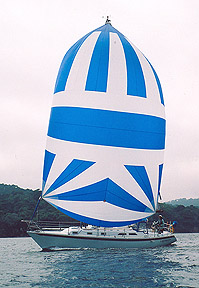“Look Ma, No Pole!”

Just because you don’t want to deal with a spinnaker pole doesn’t
mean you can’t have a real spinnaker.
  
We have some customers who used to own a Santana 30. They
felt comfortable sailing it up and down the California Coast. They enjoyed
sailing with
a 3/4 ounce symmetric spinnaker when conditions (and distances)
allowed. They recently bought an Ericson 38. A symmetric spinnaker on
the 38 would
be 60 percent larger than on the 30. The “new” boat did not
have a spinnaker pole, and the partners were leery that they could
handle it on boat this big. But they needed a downwind sail to continue
their
ocean and Bay cruising.
Our discussions started orbiting around a “cruising spinnaker” because “you
don’t need a pole,” and the cruising spinnaker is somewhat
smaller than a full sized symmetric spinnaker. In the course of the discussion,
the subject of running came up. Just how well will the cruising spinnaker
run? Run as in deep down wind. Well, without a spinnaker pole to hold
the leading edge out away from the mast (and away from the dirty air
to leeward of the mainsail), there is no spinnaker, cruising or otherwise,
that will run very well at all. Certainly not like the Santana 30 with
a symmetric spinnaker on a pole!
I pointed out that they will grow into the size of the Ericson 38, just
like they grew into the size of the Santana 30. In the fairly near future,
the new boat won’t seam all that big any more. And maybe a conventional
spinnaker pole won’t be so intimidating either. Is there a temporary
(or permanent) meeting point that allows the use of a full-sized symmetric
spinnaker without using a spinnaker pole?
The answer is YES. The solution is in the ATN “Tacker.” ATN
are the people who make the spinnaker socks. The Tacker connects one
corner of the symmetric spinnaker to the furled up jib on the headstay.
This constrains the tack of the sail to stay on the boat’s centerline.
By placing two sheets on the clew of the spinnaker, just like on a cruising
spinnaker, you can fly the symmetric sail without a pole.
The height of the Tacker is controlled by a down-haul line. You adjust
the level of the Tacker so it flies at about level with the clew of the
symmetric spinnaker. When reaching, the Tacker will be a little lower,
and when sailing free, with the spinnaker sheet eased, the Tacker will
want to be eased up somewhat.
Dousing with the Tacker is simple (assuming you are using a spinnaker
sock!). Trim the spinnaker sheet in, and then bear off until the spinnaker
collapses. Now trip the snap shackle that connects the Tacker to the
spinnaker. The sail will now be floating in the lee of the mainsail,
and you can easily pull the sock down over the sail.
  
|

